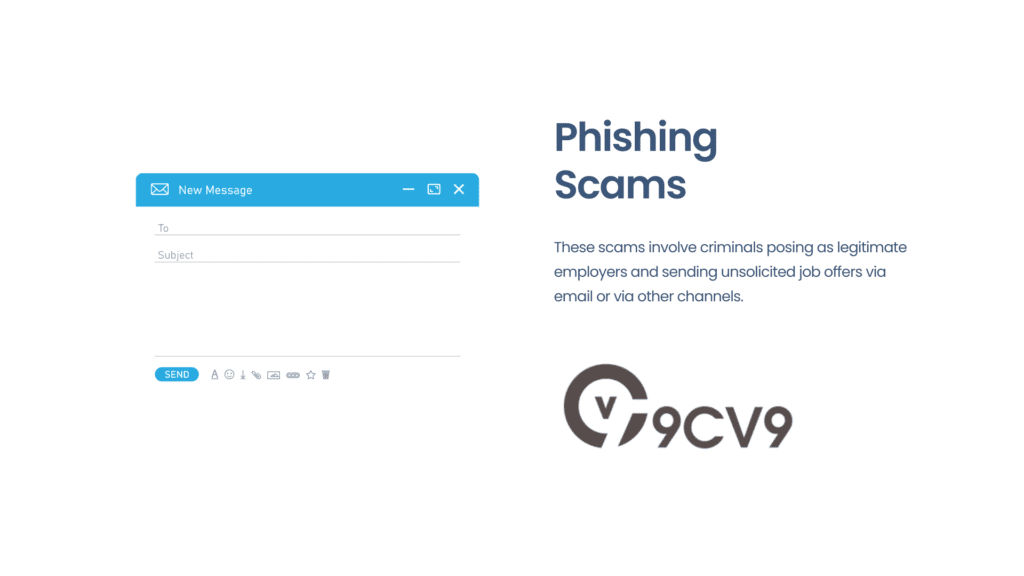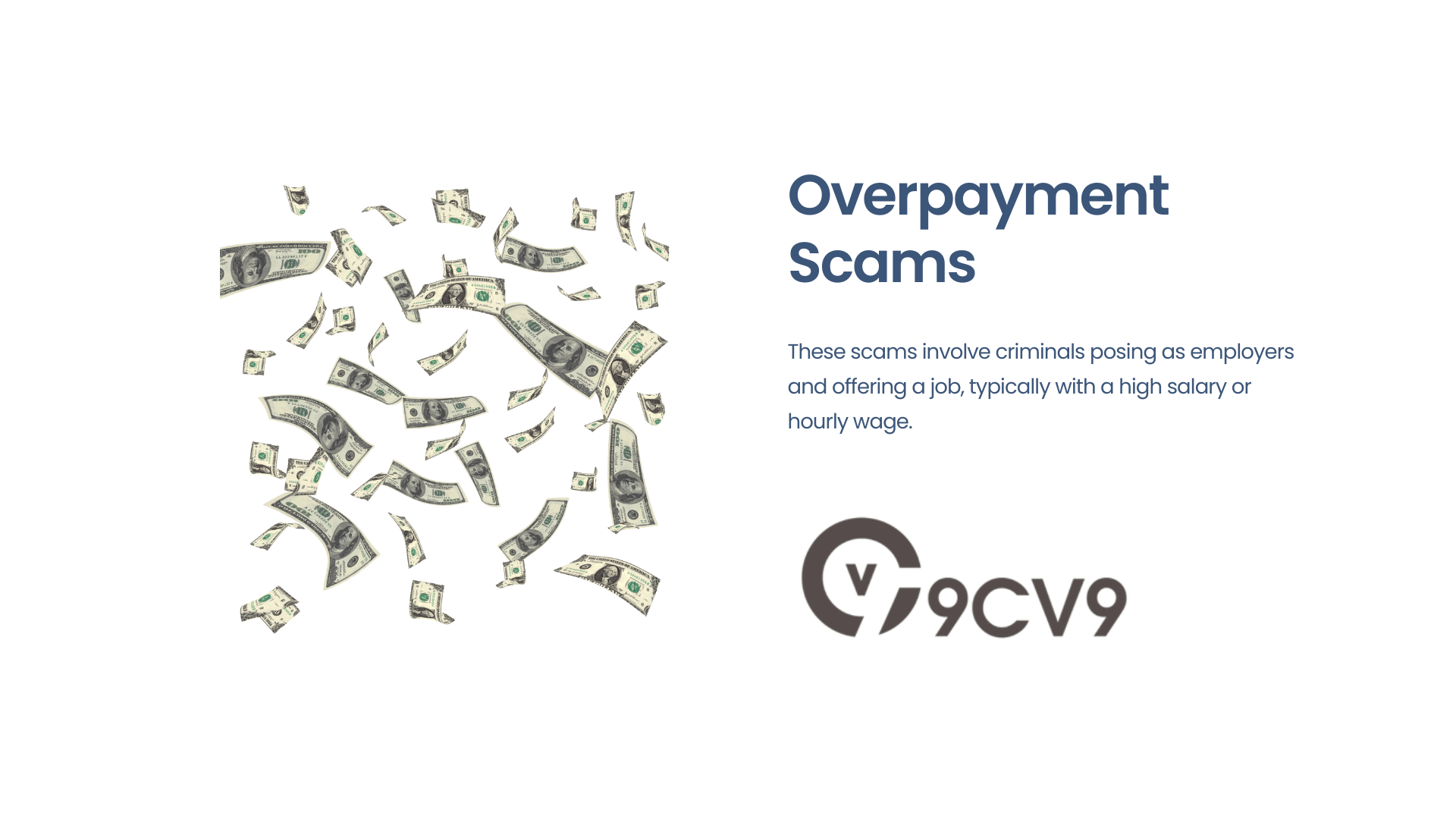Key Takeaways
- Be cautious of unsolicited job offers that promise high pay for little work or require an upfront fee.
- Research potential employers and don’t provide personal or sensitive information unless you’re certain the opportunity is legitimate.
- Stay informed, stay alert, and trust your instincts – taking these steps can help you avoid job scams and find legitimate job opportunities.
Any job that requires you to pay cash or any monetary asset upfront, the rule of thumb is to dismiss it as a scam and to report to your nearest authorities.
– 9cv9
Job scams can take on many different forms, and they can be very difficult to identify.
They are designed to prey on job seekers’ fears, hopes, and dreams, and they often appear to be legitimate opportunities.
Unfortunately, these scams can leave job seekers out of work, financially drained, and feeling defeated.
One of the most common types of job scams is a phishing scam.
This type of scam involves criminals posing as legitimate employers and sending unsolicited job offers via email.
These emails may include a link to a fake job application, which will ask for personal information such as social security numbers, bank account information, or other sensitive data.
Once the scammer has this information, they can use it for identity theft or to drain bank accounts.
Another common type of job scam is the pyramid scheme.
In this scam, job seekers are promised the opportunity to make a lot of money quickly by recruiting others to join the scheme.
However, the only way to make money is by recruiting more people, and the scheme is unsustainable.
Eventually, the scheme collapses, and those at the bottom lose all of their money.
Fake job postings are also a common tactic used by scammers.
They will post job openings on reputable job sites and social media platforms, and these jobs will appear to be legitimate opportunities.
However, once a job seeker applies for the job, they will be asked to pay a fee or provide personal information to “complete” the application.
In reality, there was never a job to begin with, and the scammer has now gained access to the job seeker’s personal information.
Another scam is hiring workers to work for illegal activities like online casinos, gambling, prostitution, etc.
For example, we previously wrote about a scam by a China-based company, Innovations Groups in Pasay Manila, that operates several fake companies to con vendors, employees, and staff to work for their online casinos.
Despite the prevalence of job scams, there are ways to protect yourself.
Knowing what to look for allows you to identify potential scams before they cause any damage.
It’s also important to be wary of unsolicited job offers and to research any company or job posting before providing personal information or paying any money.
With the right knowledge and tools, you can stay safe while job hunting and avoid being scammed.
Before we venture further into this article, we like to share who we are and what we do.
About 9cv9
9cv9 is a business tech startup based in Singapore and Vietnam with a strong presence all over the world.
With over six years of startup and business experience, and being highly involved in connecting with thousands of companies and millions of jobseekers, the 9cv9 team has listed some important learning points in this overview of how to identify and avoid job scams.
If you are looking for a job, we welcome you to apply for a job at 9cv9 now.
How to Identify and Avoid Job Scams (Updated in 2023)
- Importance of identifying and avoiding job scams
- Type of Job Scams to Watch Out for
- Red Flags to Look Out for When Applying for Jobs
- How to Protect Yourself from Job Scams
Importance of identifying and avoiding job scams
The importance of identifying and avoiding job scams cannot be overstated.
Falling victim to a job scam can have serious financial and emotional consequences, and it can put your personal information at risk.
It’s important to remember that scammers are skilled at what they do and they can be very convincing.
They often use legitimate-looking websites and job postings to lure unsuspecting job seekers in.
In addition to the financial risks, falling victim to a job scam can also be emotionally devastating.
Many job seekers invest a lot of time and effort into their job search, and the disappointment of being scammed can be crushing.
The emotional toll can be particularly high for those who are already struggling to find work, and it can lead to feelings of despair and hopelessness.
Moreover, being scammed can make it even harder to find a job.
Scammers may steal your personal information, leaving you vulnerable to identity theft.
They may also drain your bank account or rack up debt in your name, which can damage your credit score and make it harder to secure loans or credit in the future.
These consequences can have long-lasting effects on your financial stability and well-being.
Finally, identifying and avoiding job scams is essential for the broader job market as well.
Job scams create a false sense of opportunity, and they can undermine the credibility of legitimate employers and job search resources.
They also take advantage of vulnerable job seekers, perpetuating economic inequality and contributing to a lack of trust in institutions.
In summary, the importance of identifying and avoiding job scams cannot be overstated.
Protecting yourself from scams is crucial for your financial and emotional well-being, as well as for the broader job market.
In the following sections, we will explore the different types of job scams to watch out for, red flags to look out for when applying for jobs, and the best ways to protect yourself from job scams.
Type of Job Scams to Watch Out for
- Phishing Scams
- Pyramid Schemes
- Fake Job Postings
- Overpayment Scams
- Identity Theft Scams
- Task Completion Scams
1. Phishing Scams

Phishing scams are one of the most common types of job scams, and they can be very convincing.
These scams involve criminals posing as legitimate employers and sending unsolicited job offers via email or via other channels.
The email may appear to be from a reputable company, and the job offer may seem too good to be true.
One of the hallmarks of a phishing scam is the request for personal information.
The email may ask for your social security number, bank account information, or other sensitive data.
The email may also include a link to a fake job application, which will ask for personal information to “complete” the application process.
Once the scammer has this information, they can use it for identity theft or to drain your bank account.
To avoid falling victim to a phishing scam, there are several things to look out for.
Firstly, be wary of unsolicited job offers.
Legitimate employers will rarely send unsolicited emails to job seekers.
Secondly, be cautious of job offers that seem too good to be true.
If the job offer promises a lot of money for little work or no experience required, it’s likely a scam.
Thirdly, check the email address of the sender.
If the email address is a random string of letters or numbers, or if the domain is misspelled, it’s likely a scam.
If you suspect that an email is a phishing scam, do not respond to the email or click any links.
Instead, report the email to the Federal Trade Commission or to your local police and delete the email from your inbox.
It’s also a good idea to regularly monitor your bank accounts and credit reports to ensure that there is no unusual activity.
In summary, here are some general characteristics of a phishing job scam.
some general characteristics of a phishing email that may help you recognize one:
- The email may have a sense of urgency or pressure you to act quickly, such as a limited-time offer or a threat of losing the job opportunity.
- The email may contain grammatical errors or typos that are not typical of a legitimate email from a reputable company.
- The email may use a generic greeting like “Dear Applicant” instead of addressing you by name.
- The email may ask you to provide personal or sensitive information, such as your Social Security number, bank account details, or passwords.
- The email may contain a link or an attachment that looks like an official job application form but instead contains malware that can infect your computer.
Phishing scams are a common tactic used by scammers to steal personal information and drain bank accounts.
By being vigilant and cautious, you can protect yourself from falling victim to these scams.
Remember to never provide personal information to unsolicited job offers, be wary of job offers that seem too good to be true, and check the email address of the sender.
If you suspect that an email is a phishing scam, report it to the Federal Trade Commission or to your local authorities, and delete it from your inbox.
2. Pyramid Schemes

Pyramid schemes are another common type of job scam that can be very enticing, especially to those who are struggling to find work.
These schemes involve recruiting others to join the scheme, promising them the opportunity to make a lot of money quickly and easily.
The scheme may involve selling a product or service, but the primary focus is on recruiting others to join the scheme.
One of the hallmarks of a pyramid scheme is the emphasis on recruitment over sales.
In a legitimate multi-level marketing (MLM) scheme, participants earn money by selling products or services.
In a pyramid scheme, however, the emphasis is on recruiting others to join the scheme, with little or no emphasis on actual sales.
This means that participants at the bottom of the pyramid are unlikely to make any money, as they have no one to recruit beneath them.
Another red flag to look out for is a large upfront investment.
Pyramid schemes often require participants to pay a large sum of money upfront to join the scheme.
This money is then used to pay out commissions to those at the top of the pyramid.
Participants may also be required to purchase a large amount of inventory or marketing materials, which can be difficult to sell.
To avoid falling victim to a pyramid scheme, it’s important to do your research before investing any money.
Look for reviews and information about the company online, and be wary of any scheme that promises quick and easy money.
Be cautious of any scheme that requires a large upfront investment or a large purchase of inventory or marketing materials.
Remember, if it sounds too good to be true, it probably is.
If you suspect that you have been targeted by a pyramid scheme, report it to the Federal Trade Commission or to your local authorities, and contact your state attorney general’s office.
You should also warn others about the scheme to prevent them from falling victim as well.
In summary, these are the general characteristics of a pyramid scheme:
- Promises of high returns with little effort: Pyramid schemes often promise participants a high return on investment with minimal work or effort. This is often a sign that the opportunity is too good to be true.
- Focus on recruitment: In a pyramid scheme, the primary way to make money is through recruiting new members, rather than selling a product or service. This is because the scheme relies on the recruitment of new members to pay out existing members.
- Lack of a legitimate product or service: Pyramid schemes often lack a legitimate product or service that is sold to customers. Instead, the focus is on recruiting new members who pay fees to join the scheme.
- Unusual payment structure: Pyramid schemes often require members to pay a fee to join, and then recruit others to join the scheme. As new members join, the original members move up in the payment structure, with the promise of receiving a larger payout. This can create a pyramid-like structure where only those at the top of the pyramid make significant money.
- Unsustainable business model: Pyramid schemes are ultimately unsustainable, as they rely on the constant recruitment of new members to pay out existing members. Once the recruitment slows down, the scheme collapses, leaving many participants with significant financial losses.
Pyramid schemes are a common job scam that can be very enticing to those who are struggling to find work.
By being cautious and doing your research, you can avoid falling victim to these schemes.
Look out for red flags such as an emphasis on recruitment over sales, a large upfront investment, and promises of quick and easy money.
If you suspect that you have been targeted by a pyramid scheme, report it to the authorities and warn others to prevent them from falling victim as well.
3. Fake Job Postings

Fake job postings are becoming increasingly common in the digital age, and they can be very convincing.
These scams involve criminals posting fake job listings on job search websites, social media, or other online platforms.
The job posting may appear to be from a reputable company, and the job requirements and qualifications may seem legitimate.
One of the hallmarks of a fake job posting is the lack of information about the company.
Legitimate job postings will usually include information about the company, such as the company’s name, location, and website.
If the job posting does not include this information or provides very little information, it may be a red flag.
Another red flag to look out for is a request for personal information.
Fake job postings may ask for personal financial information, such as your social security number, bank account information, or other sensitive data, as part of the application process.
Legitimate employers will rarely ask for financial information during the application process.
To avoid falling victim to a fake job posting, there are several things to look out for.
Firstly, be wary of job postings that seem too good to be true.
If the job requirements or qualifications seem unrealistic, it’s likely a scam.
Secondly, research the company before applying for the job.
Look for information about the company online and check their website to see if the job posting is legitimate.
For example, on 9cv9, there are reviews and company descriptions for our jobseekers to find out more about the company.
If you suspect that a job posting is fake, do not apply for the job or provide any personal information.
Instead, report the job posting to the website or platform where it was posted and contact the company directly to verify the job posting’s authenticity.
In summary, these are the characteristics of a fake job posting.
- Unprofessional language: A fake job posting may contain unprofessional language or typos that suggest it was hastily written or not vetted by a legitimate employer.
- Generic job titles: Fake job postings may use generic job titles that do not clearly describe the responsibilities or qualifications required for the position.
- No company information: A fake job posting may lack any information about the company that is supposedly hiring. This can include a missing company name, website, or contact information.
- Immediate hiring: A fake job posting may claim that the position is available immediately and that the company is in a rush to hire someone. This urgency can be a red flag that the posting is not legitimate.
- Upfront payment required: Some fake job postings may require applicants to pay a fee upfront to apply for the job or receive additional information about the position. This is a common tactic used by scammers to make money from job seekers.
- Lack of interview or screening process: A fake job posting may claim that the applicant has been selected for the position without any interview or screening process. Legitimate employers typically have a formal hiring process that involves interviews, reference checks, and other screening methods.
That said, one has to be careful not to mix these characteristics with those genuine recruiters who use technology to drive their recruitment efficiently and to have interviews at a later stage.
Fake job postings are becoming increasingly common in the digital age, and they can be very convincing.
By being vigilant and cautious, you can protect yourself from falling victim to these scams.
Remember to look out for red flags such as a lack of information about the company, requests for personal information, and job requirements that seem too good to be true.
If you suspect that a job posting is fake, report it to the website or platform where it was posted and contact the company directly to verify its authenticity.
4. Overpayment Scams

Overpayment scams are another type of job scam that can be very convincing.
These scams involve criminals posing as employers and offering a job, typically with a high salary or hourly wage.
They will then send the victim a check for more than the agreed-upon amount, claiming that it was a mistake, and asking the victim to deposit the check and send the overpaid amount back to them.
The check may appear to be legitimate, but in reality, it is a fake or fraudulent check.
Once the victim has deposited the check and sent the overpaid amount back to the scammer, the check will bounce, leaving the victim responsible for the entire amount.
To avoid falling victim to an overpayment scam, it’s important to be cautious when accepting job offers.
Be wary of any job offer that seems too good to be true, and do your research before accepting the job.
Look for reviews and information about the company online, and be cautious of any job offer that requires you to pay money upfront or to provide personal information.
If you receive a check from an employer that seems suspicious, do not deposit the check or send any money back to the employer.
Instead, contact your bank and ask them to verify the check’s authenticity.
You can also contact the company directly to verify the job offer and the check.
In summary, these are the general characteristics of an overpayment job scam:
- Unsolicited offers: The scammer may approach you with an unsolicited offer, such as an email or message, to purchase something from you, such as a product or service.
- Overpayment: The scammer will then send you a payment that is significantly higher than the agreed-upon amount, usually via check or wire transfer.
- Urgency: The scammer may claim that they need the product or service urgently and pressure you to send them the excess payment quickly.
- Request for a refund: The scammer will then request that you refund them the excess payment, often before the original payment has cleared.
- Payment reversal: Once you send back the excess payment, the original payment will be reversed, leaving you with no payment and potentially out of pocket for any expenses incurred during the process.
- Unusual payment method: The scammer may request an unusual payment method, such as a wire transfer or gift card, which can be difficult to trace and recover.
Overpayment scams are a common type of job scam that can be very convincing.
By being cautious and doing your research, you can avoid falling victim to these scams.
Look out for red flags such as a job offer that seems too good to be true, requests for personal information or money upfront, and suspicious checks.
If you receive a suspicious check, do not deposit it or send any money back to the employer.
Contact your bank and the company directly to verify the authenticity of the check and the job offer.
5. Identity Theft Scams

Identity theft scams are a serious threat that can have long-lasting consequences for their victims.
These scams involve criminals posing as legitimate employers and tricking job seekers into providing sensitive personal information, such as their social security number or date of birth.
The criminals can then use this information to steal the victim’s identity and commit fraud.
One of the hallmarks of an identity theft scam is a request for personal information that is not necessary for the job application process.
Legitimate employers will rarely ask for sensitive personal information during the job application process, so if a job posting or employer is requesting this information, it should be a red flag.
Another red flag to look out for is a job offer requiring you to pay upfront.
Any job that requires you to pay cash or any monetary asset upfront, the rule of thumb is to dismiss it as a scam and to report to your nearest authorities.
– 9cv9
Legitimate employers will not require you to pay money to apply for a job or to secure a position, so any job offer that requires payment should be viewed with suspicion.
To protect yourself from identity theft scams, it’s important to be cautious when applying for jobs online.
Look for job postings on reputable websites and research the company before applying.
If a job posting or employer seems suspicious, it’s best to err on the side of caution and not apply for the job.
If you suspect that you have been the victim of an identity theft scam, it’s important to act quickly.
Contact your bank and credit card companies to report any suspicious activity and place fraud alerts on your accounts.
You should also report the scam to the Federal Trade Commission and file a police report.
In summary, these are the general characteristics of an identity scam:
- Unsolicited requests: The scammer may contact you via phone, email, or text message and request personal information, such as your Social Security number, date of birth, or bank account information.
- Urgency: The scammer may claim that there is an urgent matter that requires your immediate attention and pressure you to act quickly.
- Threats: The scammer may threaten legal action or harm if you do not comply with their requests.
- Phishing: The scammer may use phishing techniques, such as creating a fake website or email that looks like a legitimate company or organization, to trick you into providing your personal information.
- Offers of help: The scammer may offer to help you with a problem, such as a computer virus, and request remote access to your computer to steal your personal information.
- Unauthorized charges: The scammer may use your personal information to make unauthorized charges on your credit cards or bank accounts.
Identity theft scams are a serious threat to job seekers, and it’s important to be vigilant when applying for jobs online.
Look out for red flags such as requests for personal information or payment upfront, and research the company before applying for the job.
If you suspect that you have been the victim of an identity theft scam, act quickly to report the scam and protect your identity.
6. Task Completion Scams

Task completion scams work like this.
The recruiter will tell the candidate to complete a few tasks to boost the sales of the company or of the platform.
Once certain tasks are done, a small incentive will be sent to the candidate to “convince” him that the job and work are legitimate.
In truth, the small reward serves as bait into a trap.
Next, the recruiter will ask the candidate to pay money in order to complete those tasks for a greater reward.
In a sense, it is to give money to the company.
Since the candidate was paid the small reward earlier, he/she has learned to trust the recruiter and hence, is inclined now to spend money (either through Paypal, money transfer, or through cryptocurrencies) to the recruiter.
In this case, the “fish is caught in the net” and the recruiter will be asking for more money in order to get paid more.
Since the candidate has earlier transferred his/her own money to the recruiter, the candidate feels more obliged to be transferring more money in order to get back that transferred money.
A “sunk cost” gambling fallacy.
In a recent case, a man looking for a part-time job loses Rs 3.42 lakh (~4,100 USD) of his hard-earned money to fraudsters acting as hiring managers for Amazon. According to the news report, when he inquired about the work, the fake recruiter told him that the job seeker has to work towards increasing the sale of the company’s online platform by completing various tasks.
If there are tasks needed to be done before the signing of an employment contract and are not part of a formal assessment, it is a huge red flag.
According to the Singapore Police Force, at least 1,013 people have fallen for a job scam from January to March 2023, which entices them by giving them a small commission for doing a survey, with losses amounting to at least S$17.6 million (~US$13.2 million).
According to the news report, most job survey scams follow a similar modus operandi:
- Victims would receive a message on WhatsApp or Telegram to take part in a survey or market research
- This would usually be made to look like it was for food delivery sites such as Deliveroo and Foodpanda, tourism, or events
- After they complete the survey, victims would then receive a small commission or sum of money, making them believe that the activity was legitimate
- Once that was done, victims would get another WhatsApp or Telegram contact telling them there were “more rewarding jobs”
- This second contact would then ask the victims to perform tasks such as “boosting” the value of cryptocurrencies or “rating” mobile applications to improve their rankings on app stores
- To do these tasks, the victims had to create an account on scam websites and transfer money to bank accounts provided by the scammers
- In some cases, the victims would be told to put in even more of their own money for a variety of reasons.
Hence, in this modern era, in which technology is prevalent in our lives, it is crucial to watch out for such task-completion scams.
The general rule of thumb is to always receive money and not to give money in the course of your employment.
Red Flags to Look Out for When Applying for Jobs
When applying for jobs, it’s important to be aware of red flags that may indicate a job scam.
By being vigilant and looking out for these warning signs, you can avoid falling victim to fraudsters and protect your personal information.
One red flag to watch out for is a job posting that guarantees a high salary or hourly wage with little to no experience required.
While it’s possible to land a high-paying job without much experience, it’s rare.
A job posting that promises a high salary with little to no experience required should be viewed with suspicion.
Another red flag is a job posting requiring you to pay upfront.
The general rule of thumb is to always receive money and not to give money in the course of your employment.
Legitimate employers will not require you to pay money to apply for a job or to secure a position, so any job offer that requires payment should be viewed with suspicion.
A third red flag to watch out for is a job posting that requires you to provide sensitive personal information, such as your social security number or date of birth, during the application process.
Legitimate employers will rarely ask for this information during the job application process, so any job posting or employer that requests this information should be viewed with suspicion.
It’s also important to be cautious of job postings that have spelling or grammar errors or use generic job titles.
These job postings may be scams designed to lure in unsuspecting job seekers.
Finally, be wary of job postings that require you to complete tasks or provide sensitive personal information before you can even apply for the job.
These tasks may be designed to steal your personal information or to get you to complete work without any intention of paying you.
In summary, there are several red flags to watch out for when applying for jobs.
Look out for job postings that guarantee a high salary with little to no experience required, require payment upfront, or request sensitive personal information during the application process.
Be cautious of job postings with spelling or grammar errors or generic job titles, and be wary of job postings that require you to complete tasks or provide personal information before you can even apply.
By being vigilant and looking out for these red flags, you can avoid falling victim to job scams and protect your personal information.
How to Protect Yourself from Job Scams
Protecting yourself from job scams requires a combination of vigilance and common sense.
By taking a few simple steps, you can significantly reduce your risk of falling victim to fraudsters and protect your personal information.
One of the most important things you can do to protect yourself from job scams is to research potential employers thoroughly.
Check the company’s website, read reviews from current and former employees, and verify that the company is legitimate before applying for a job.
If you’re unsure whether a company is legitimate, reach out to your local business directory to check for the legitimacy of the business.
For example, you can search on 9cv9 Job Portal more about the company information and the reviews garnered so far for that company.
Another way to protect yourself is to use caution when sharing personal information.
Only provide personal information that is necessary for the job application process, and be wary of any requests for sensitive information such as your social security number or date of birth.
Legitimate employers will rarely ask for this information during the application process, so any job posting or employer that requests this information should be viewed with suspicion.
It’s also a good idea to use a separate email address and phone number when applying for jobs online.
This can help protect your personal information and prevent scammers from contacting you directly.
When you’re contacted by a potential employer, be sure to ask plenty of questions.
Legitimate employers will be happy to answer your questions and provide more information about the job, while scammers may become evasive or aggressive when questioned.
Another way to protect yourself is to trust your instincts.
If a job offer seems too good to be true or makes you uncomfortable in any way, it’s better to err on the side of caution and decline the offer.
Finally, be sure to report any suspected job scams to the appropriate authorities.
This can help prevent other job seekers from falling victim to the same scam and may even help law enforcement track down and prosecute the scammers.
In Singapore, for example, there is a mobile application created by the Government of Singapore called “ScamShield“. According to the website, the application has 3 features:
- Automatically blocks scam calls
- Automatically detects scam messages
- Allows users to report scam messages and calls
People in the country are highly advised to download the mobile app to reduce scam rates. You might want to search for a local mobile app or technology that is available in your local country that does the same features as ScamShield to protect you and your loved ones from scams.
In summary, protecting yourself from job scams requires a combination of vigilance and common sense.
Research potential employers thoroughly, use caution when sharing personal information, and trust your instincts. Ask plenty of questions and report any suspected job scams to the appropriate authorities.
By taking these steps, you can significantly reduce your risk of falling victim to job scams and protect your personal information.
Conclusion
Job scams are unfortunately common in today’s job market, and it’s important to be aware of the red flags and take steps to protect yourself.
By learning how to identify and avoid job scams, you can significantly reduce your risk of falling victim to fraudsters and protect your personal information.
Remember to be cautious of unsolicited job offers, especially those that promise high pay for little work or require you to pay a fee upfront.
Do your research on potential employers and be wary of any requests for personal or sensitive information.
Trust your instincts and don’t hesitate to ask plenty of questions before accepting a job offer.
If you do fall victim to a job scam, don’t be embarrassed or ashamed.
Report the incident to the appropriate authorities and take steps to protect your personal information.
By reporting job scams, you can help prevent others from falling victim to the same fraudsters.
In short, being proactive and vigilant is the key to identifying and avoiding job scams.
Remember to stay informed, stay alert, and always trust your instincts.
By taking these steps, you can protect yourself and find legitimate job opportunities that will help you achieve your career goals.
If you find this article useful, why not share it with your family and friends and also leave a nice comment below?
We, at the 9cv9 Research Team, strive to bring the latest and most meaningful data, guides, and statistics to your doorstep.
If you are looking for a proper job that is scam-free, then hop to 9cv9 Modern Job Portal to find the best jobs and internships to kickstart your ideal career path.































![Writing A Good CV [6 Tips To Improve Your CV] 6 Tips To Improve Your CV](https://blog.9cv9.com/wp-content/uploads/2020/06/2020-06-02-2-100x70.png)


